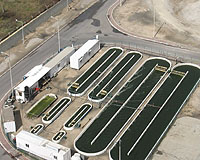 |
Waterloo WI (SPX) Jul 28, 2009 As lawmakers in Washington, D.C., debate new federal climate-change legislation, Wisconsin's dairy industry is leading the way in demonstrating the benefits of using cow manure methane digester biogas. In the last several years, a growing number of dairy farms in Wisconsin have installed GE Energy's Jenbacher biogas engines to generate needed renewable electricity for onsite power and the local grid. GE's newly installed, advanced Jenbacher biogas engine technology is generating 633 kilowatts (kW) in renewable energy at the Crave Brothers Farm, LLC in Waterloo, Wisc.. "Installing GE Energy's Jenbacher biogas technology is playing an important role in our ongoing initiatives to reduce the operational costs as well as the environmental impacts of our dairy operations," said Charles Crave, one of the farm's co-owners. "We hope that other dairy farms around the country adopt similar technologies in recognition of the agricultural community's increasingly important role in addressing the country's energy and climate-change concerns." This week, Crave Brothers is hosting the 2009 Farm Technology Days, one of the country's largest agricultural technology expositions. More than 80,000 people are expected to visit the Crave Brothers site, which is located about an hour west of Milwaukee. Crave Brothers is a 29-year-old, family run dairy farm and on-site cheese plant that is nationally known for its progressive use of technologies to reduce the environmental impacts of its operations. The 1,700-acre farm currently has nearly 1,000 milk cows and 700 heifers. By converting the manure to methane biogas and using it to generate electricity in GE's Jenbacher unit, less greenhouse gas is able to escape into the atmosphere. The system also is helping Crave Brothers lower its operational costs, including through the sale of energy to the regional grid and more cost-effective manure management. Crave Brothers originally had operated an older, less powerful biogas system to support some of the farm's electricity requirements. However, the owners later installed GE's Jenbacher technology after deciding they could be generating even more electricity with a more powerful Jenbacher engine, Crave said. In May 2009, one of GE's ecomagination-certified Jenbacher J312 biogas engines was commissioned at the Crave Brothers site and is generating 633 kW of electricity to support the site's dairy operations. Surplus power from the engine is being sold to the regional grid in Wisconsin, which is aggressively supporting the expansion of renewable energy production. Renewable energy developer Clear Horizons, which built and owns the digester biogas plant at the Crave Brothers site, is supplying the engine's electricity to regional grid operator WE Energies, the trade name of Wisconsin Electric Power Co. and Wisconsin Gas LLC, the principal utility subsidiaries of Wisconsin Energy Corporation. Widely accepted in Europe, the use of biogas digester systems with GE's Jenbacher engines is a fairly new U.S. agri-business trend. In the past, some U.S. farmers had used old diesel motors and smaller gas engines until they began installing more durable, robust gas engines in recent years. "Agricultural waste is one of the country's leading sources of methane gas emissions and GE is pleased to help supply its proven gas engine technology to Crave Brothers as the U.S. farming community embraces this renewable energy technology," said Roger George, general manager for GE's Jenbacher gas engine business in North America. Inland Power Group, GE's Jenbacher gas engine distributor for the midwestern U.S., supplied the biogas engine to system operator/owner Clear Horizons. Share This Article With Planet Earth
Related Links GE Energy Bio Fuel Technology and Application News
 Algae blooms into promising biofuel
Algae blooms into promising biofuelWashington (AFP) July 26, 2009 Some call it pond scum, but algae is drawing increasing attention as a source of biofuel that can help replace petroleum or fuels made from crops like corn or soybeans. The notion of using algae to produce fuel has been around for decades, but has garnered new interest and investment amid a search for energy sources that will limit carbon dioxide emissions blamed for climate change. ... read more |
|
| The content herein, unless otherwise known to be public domain, are Copyright 1995-2009 - SpaceDaily. AFP and UPI Wire Stories are copyright Agence France-Presse and United Press International. ESA Portal Reports are copyright European Space Agency. All NASA sourced material is public domain. Additional copyrights may apply in whole or part to other bona fide parties. Advertising does not imply endorsement,agreement or approval of any opinions, statements or information provided by SpaceDaily on any Web page published or hosted by SpaceDaily. Privacy Statement |